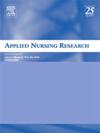The mediating role of self-efficacy in the relationship between spirituality and burnout among intensive care unit nurses: a pathway analysis
IF 2.2
4区 医学
Q1 NURSING
引用次数: 0
Abstract
Background
Burnout is a critical issue among intensive care unit (ICU) nurses, impacting both their well-being and excellence in care. Spiritual wellbeing and self-efficacy have been identified as potential protective factors against burnout, yet their interrelationships remain unclear, particularly in the Indonesian nurse's context.
Objectives
This study examines the role of spirituality and self-efficacy in burnout and explores the mediating effect of self-efficacy.
Methods
A cross-sectional correlational design with convenience sampling was conducted among 410 ICU nurses in public hospitals in East Java, Indonesia. Participants completed validated measures of burnout, spirituality and self-efficacy. Partial least squares structural equation modelling was employed to test direct and indirect relationships between variables.
Results
Most participants were female, with a mean age of around 31 years and more than two years of ICU experience. Higher workload significantly predicted greater burnout (β = 0.21, p < 0.001), while spirituality (β = −0.17, p = 0.001) and self-efficacy (β = −0.24, p < 0.001) negatively predicted burnout. Mediation analysis confirmed that self-efficacy mediated the relationship between spirituality and burnout (β = −0.13, p < 0.001), indicating that ICU nurses with higher levels of spiritual wellbeing reported stronger self-efficacy, which in turn predicted lower burnout.
Conclusion
The findings reveal that self-efficacy is a key mechanism through which spirituality mitigates burnout among ICU nurses. These insights may inform the development of healthy work environment initiatives that incorporate spiritual support and self-efficacy training through structured mentorship and organisational systems, ultimately reducing burnout and enhancing nurses' resilience in high-stress settings.
自我效能感在重症监护室护士灵性与倦怠关系中的中介作用:一个通路分析
背景:职业倦怠是重症监护病房(ICU)护士的一个重要问题,它影响着护士的幸福感和护理质量。精神健康和自我效能已被确定为防止倦怠的潜在保护因素,但它们之间的相互关系尚不清楚,特别是在印度尼西亚护士的背景下。目的探讨精神和自我效能感在职业倦怠中的作用,并探讨自我效能感的中介作用。方法采用方便抽样的横断面相关设计,对东爪哇省公立医院410名ICU护士进行调查。参与者完成了倦怠、精神和自我效能的有效测量。采用偏最小二乘结构方程模型检验变量之间的直接和间接关系。结果大多数参与者为女性,平均年龄31岁左右,有2年以上ICU工作经验。高工作负荷显著预测倦怠(β = 0.21, p < 0.001),而灵性(β = - 0.17, p = 0.001)和自我效能(β = - 0.24, p < 0.001)负向预测倦怠。中介分析证实,自我效能感在灵性与倦怠之间起中介作用(β = - 0.13, p < 0.001),表明精神健康水平越高的ICU护士自我效能感越强,进而预测倦怠程度越低。结论自我效能感是灵性缓解ICU护士职业倦怠的重要机制。这些见解可以为健康工作环境倡议的发展提供信息,通过结构化的指导和组织系统,将精神支持和自我效能培训结合起来,最终减少倦怠,增强护士在高压力环境中的适应能力。
本文章由计算机程序翻译,如有差异,请以英文原文为准。
求助全文
约1分钟内获得全文
求助全文
来源期刊

Applied Nursing Research
医学-护理
CiteScore
4.50
自引率
0.00%
发文量
65
审稿时长
70 days
期刊介绍:
Applied Nursing Research presents original, peer-reviewed research findings clearly and directly for clinical applications in all nursing specialties. Regular features include "Ask the Experts," research briefs, clinical methods, book reviews, news and announcements, and an editorial section. Applied Nursing Research covers such areas as pain management, patient education, discharge planning, nursing diagnosis, job stress in nursing, nursing influence on length of hospital stay, and nurse/physician collaboration.
 求助内容:
求助内容: 应助结果提醒方式:
应助结果提醒方式:


